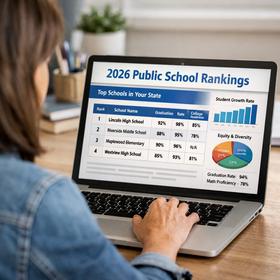Serving 414 students in grades Prekindergarten-5, Swanson Traditional School ranks in the top 10% of all schools in Indiana for overall test scores (math proficiency is top 10%, and reading proficiency is top 10%).
The percentage of students achieving proficiency in math is 65-69% (which is higher than the Indiana state average of 39%). The percentage of students achieving proficiency in reading/language arts is 55-59% (which is higher than the Indiana state average of 41%).
The student-teacher ratio of 10:1 is lower than the Indiana state level of 15:1.
Minority enrollment is 45% of the student body (majority Black), which is higher than the Indiana state average of 37% (majority Hispanic and Black).
Quick Facts (2026)
- Grades: Prekindergarten-5
- Enrollment: 414 students
- Student-Teacher Ratio: 10:1
- Minority Enrollment: 45%
- Overall Testing Rank: Top 10% in IN
- Math Proficiency: 65-69% (Top 10%)
- Reading Proficiency: 55-59% (Top 20%)
- Science Proficiency: 50-54% (Top 20%)
- Source: National Center for Education Statistics (NCES), IN Dept. of Education
Top Rankings
Swanson Traditional School ranks among the top 20% of public schools in Indiana for:
Category
Attribute
Overall Rank
Most improved public schools
Math Proficiency
Reading/Language Arts Proficiency
Science Proficiency
Diversity
School Overview
Swanson Traditional School's student population of 414 students has grown by 14% over five school years.
The teacher population of 40 teachers has grown by 90% over five school years.
Grades Offered
Grades Prekindergarten-5
(No virtual instruction)
(No virtual instruction)
Total Students
414 students
Gender %
Total Classroom Teachers
40 teachers
School Calendar
Last Day of School
Thu. Jun 4, 2026
School Rankings
Swanson Traditional School ranks within the top 10% of all 1,743 schools in Indiana (based off of combined math and reading proficiency testing data).
The diversity score of Swanson Traditional School is 0.64, which is more than the diversity score at state average of 0.57. The school's diversity has stayed relatively flat over five school years.
Overall Testing Rank
#148 out of 1743 schools
(Top 10%)
(Top 10%)
Math Test Scores (% Proficient)
65-69%
39%
Reading/Language Arts Test Scores (% Proficient)
55-59%
41%
Science Test Scores (% Proficient)
50-54%
34%
Student-Teacher Ratio
10:1
15:1
American Indian
n/a
n/a
Asian
3%
3%
Hispanic
10%
15%
Black
17%
13%
White
55%
63%
Hawaiian
n/a
n/a
Two or more races
15%
6%
All Ethnic Groups
Participates in the National School Lunch Program (NSLP)
Yes
Eligible for Free Lunch
44%
43%
Eligible for Reduced Lunch
6%
6%
School Statewide Testing
School District Name
Source: National Center for Education Statistics (NCES), IN Dept. of Education
Frequently Asked Questions
What is Swanson Traditional School's ranking?
Swanson Traditional School is ranked #148 out of 1,743 schools, which ranks it among the top 10% of public schools in Indiana.
What schools are Swanson Traditional School often compared to?
Swanson Traditional Schoolis often viewed alongside schools like Darden Elementary School, Clay International Academy by visitors of our site.
What percent of students have achieved state testing proficiency in math and reading?
65-69% of students have achieved math proficiency (compared to the 39% IN state average), while 55-59% of students have achieved reading proficiency (compared to the 41% IN state average).
How many students attend Swanson Traditional School?
414 students attend Swanson Traditional School.
What is the racial composition of the student body?
55% of Swanson Traditional School students are White, 17% of students are Black, 15% of students are Two or more races, 10% of students are Hispanic, and 3% of students are Asian.
What is the student-teacher ratio of Swanson Traditional School?
Swanson Traditional School has a student ration of 10:1, which is lower than the Indiana state average of 15:1.
What grades does Swanson Traditional School offer ?
Swanson Traditional School offers enrollment in grades Prekindergarten-5 (No virtual instruction).
What school district is Swanson Traditional School part of?
Swanson Traditional School is part of South Bend Community School Corporation School District.
In what neighborhood is Swanson Traditional School located?
Swanson Traditional School is located in the Swanson Highlands neighborhood of South Bend, IN.
School Reviews
5 10/10/2025
My son was in a private school that did not have the resources to accomodate his learning. He was only in Kindergarten but his learning level was very demanding for a Kindergarten teacher. Mrs. Katie Clark at Swanson began her first year with Swanson and My son was assigned to her class. I never thought my son was going to accomplish anything in Kindergarten except learn better social skills. I was so wrong. Katie Clark took on a classroom with all different levels of learning and catered to each one. Every child in Mrs. Clark's class took home more than just learning, they learned self esteem and confidence that I have never seen a teacher accomplish as well as Mrs. Clark. My child was very fortunate to have Mrs. Clark, she is the very best Kindergarten Teacher I have every seen. M
Review Swanson Traditional School. Reviews should be a few sentences in length. Please include any comments on:
- Quality of academic programs, teachers, and facilities
- Availability of music, art, sports and other extracurricular activities
Recent Articles

Public School Rankings: Are They Accurate in 2026?
Are public school rankings accurate? Learn how rankings are calculated in 2026, what they miss, and how families can evaluate schools wisely.

How Are U.S. Public Schools Doing in 2026?
A 2026 update on how U.S. public schools are performing academically, financially, and socially in a post-pandemic era.

Helping Your Child Navigate Friendship Drama at School
Meta Description: Practical 2026 strategies for helping your child navigate friendship drama at school with confidence, empathy, and resilience.









